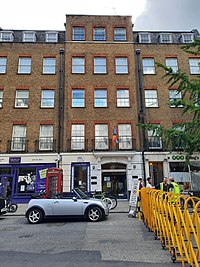
Photo from wikipedia
OBJECTIVE MSM in India are at a high risk for HIV infection given psychosocial challenges, sexual orientation stress, and stigma. We examined the cost-effectiveness of a novel resilience-based psychosocial intervention… Click to show full abstract
OBJECTIVE MSM in India are at a high risk for HIV infection given psychosocial challenges, sexual orientation stress, and stigma. We examined the cost-effectiveness of a novel resilience-based psychosocial intervention for MSM in India. DESIGN We parameterized a validated microsimulation model (CEPAC) with India-specific data and results from a randomized trial and examined two strategies for MSM: status quo HIV care (SQ), and a trial-based psychosocial intervention (INT) focused on building resilience to stress, improving mental health, and reducing condomless anal sex (CAS). METHODS We projected lifetime clinical and economic outcomes for MSM without HIV initially. Intervention effectiveness, defined as reduction in self-reported CAS, was estimated at 38%; cost was $49.37/participant. We used a willingness-to-pay threshold of US$2100 (2019 Indian per capita GDP) per year of life saved (YLS) to define cost-effectiveness. We also assessed the 5-year budget impact of offering this intervention to 20% of Indian MSM. RESULTS Model projections showed the intervention would avert 2940 HIV infections among MSM over 10 years. Over a lifetime horizon, the intervention was cost-effective (ICER = $900/YLS). Results were most sensitive to intervention effectiveness and cost; the intervention remained cost-effective under plausible ranges of these parameters. Offering this intervention in the public sector would require an additional US$28 M over 5 years compared with SQ. CONCLUSION A resilience-based psychosocial intervention integrated with HIV risk reduction counseling among MSM in India would reduce HIV infections and be cost-effective. Programs using this approach should be expanded as a part of comprehensive HIV prevention in India.
Journal Title: AIDS
Year Published: 2022
Link to full text (if available)
Share on Social Media: Sign Up to like & get
recommendations!